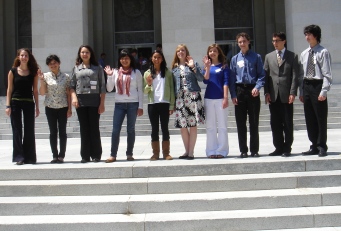
Don’t let anyone convince you that today’s teenagers are all too busy watching Gossip Girl to notice what’s going on the world. At least some of them are all too aware that they’ll be inheriting whatever their elders leave them in the way of climate policy–a promising start or a global Gordian knot.
So, in Sacramento on Monday, California Air Resources Board chair Mary Nichols witnessed some thoughtful, engaged, youth-in-action as she fielded sophisticated questions from the newly-inaugurated 2009 California Climate Champions.
Over lunch, these ten high school students asked Nichols about the future of electric cars in the state, how to help low-income Californians reduce emissions, the availability of renewable energy sources, and how CARB is dealing with political resistance to California’s Global Warming Solutions Act, AB 32.
Mark Bessen, a 2009 Climate Champion from Palos Verdes High School in Rolling Hills Estates, asked Nichols how society can translate science into political action.
“That is the secret of life,” she replied.
Now in it’s second year, the California Climate Champions program selects high school students from across the state to serve as educators about global warming and to “champion” projects that address climate change issues in their own communities.
This year’s students are planning a diverse set of projects that include alternative fuels, solar power, water conservation, and large-scale composting. For example, Nicholas Dahlquist from Rim of the World High School in Lake Arrowhead plans to use chemistry to explore the potential for powering school buses with waste vegetable oil.
“The idea is to take used vegetable oil from deep frying and convert it into a fuel you can use in any diesel engine,” said Dalquist. “The process is relatively straightforward.” Currently, using vegetable oil as a diesel fuel requires some engine modification.
The challenge, he says, is getting people to actually use the fuels, so raising awareness about alternative fuels and working with local transportation authorities to explore possibilities are both aspects of his project plan.
“Biodiesel from waste oil, unlike biodiesel in general, does not require food crops in order to create it. It’s basically a renewable resource that would otherwise be waste,” he said.
Other champions include Soraya Okuda, a student at Lowell High School in San Francisco, who is working to establish a composting system at San Francisco State University and at the nearby Stonestown Galleria. Another, Jason Bade, from Aragon High School in Foster City, plans to lobby cities to develop programs that help homeowners purchase and install rooftop solar panels.
Read about the rest of the 2009 Climate Champions and check in on the progress of last year’s Champions and their projects at www.climatechamps.org.
One thought on “Climate Change: The Next Generation”
Comments are closed.

It is reassuring to know that we are leaving our earth to this generation of dedicated environmentists.